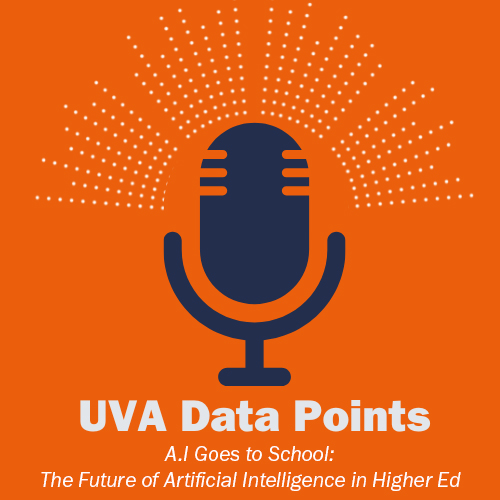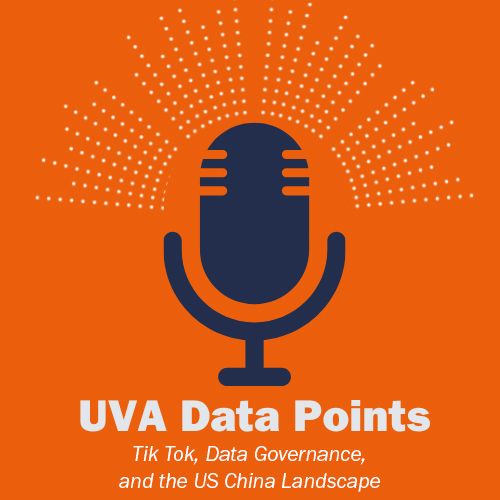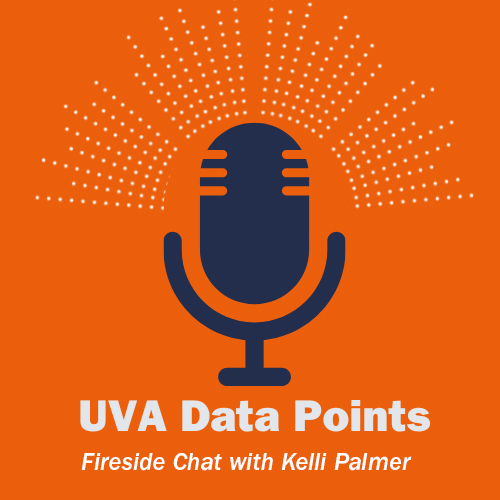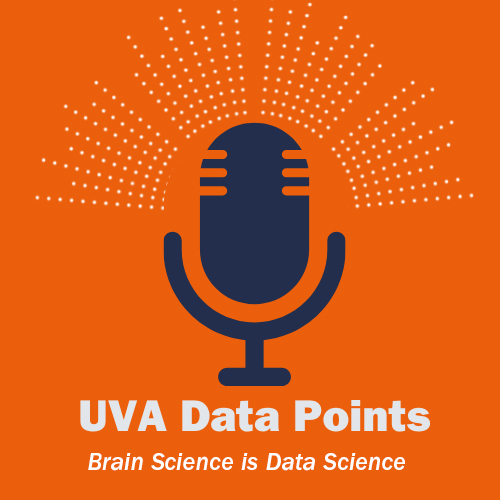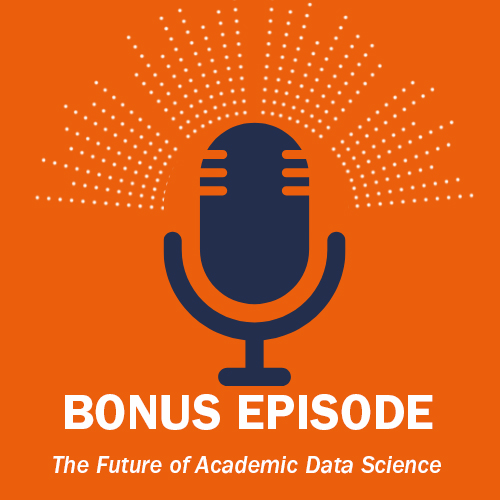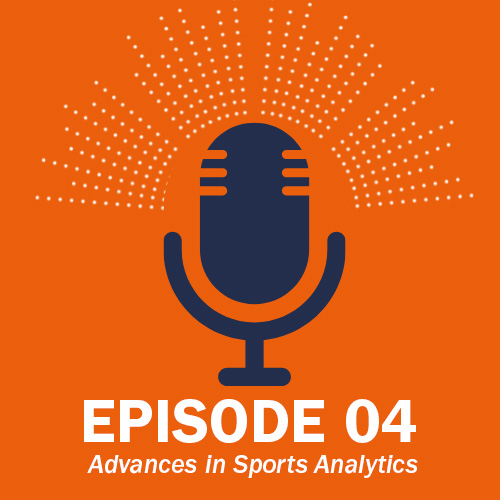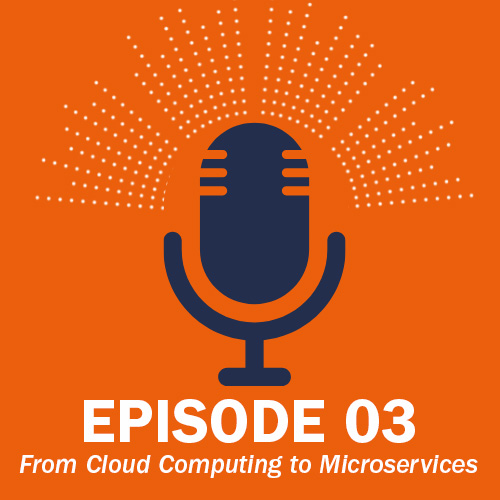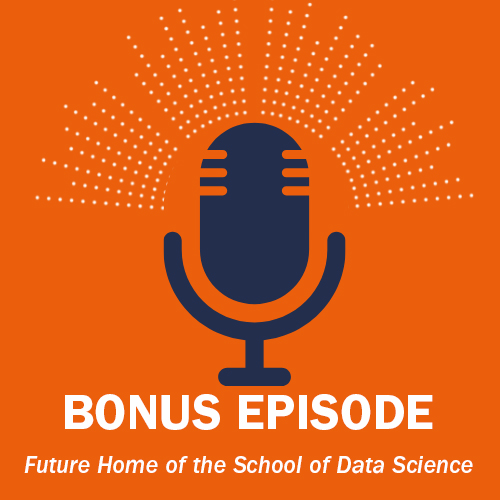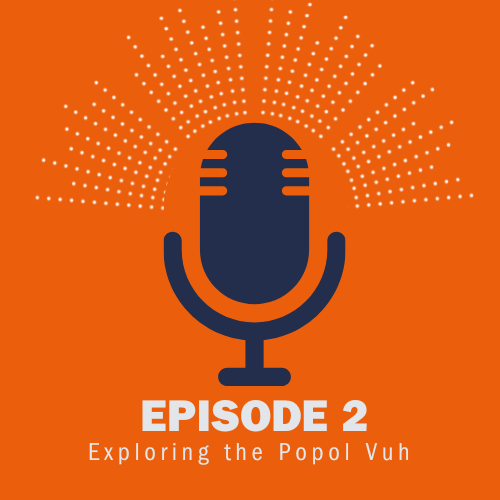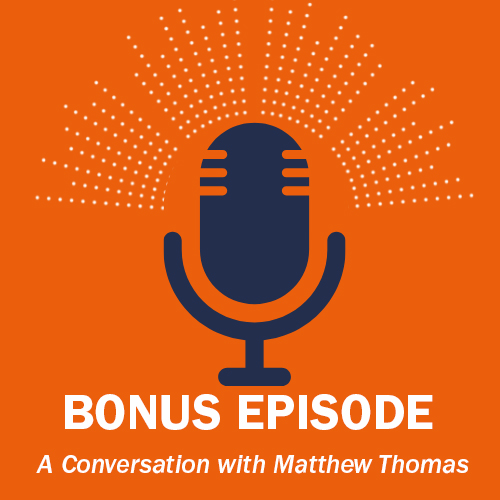Discover UVA Data Points
UVA Data Points

36 Episodes
Reverse
The UVA School of Data Science was formed in September 2019 and has since grown in its collaborations, partnerships, program offerings, and teaching and research personnel. We are now constructing a new facility that will house the School of Data Science at the University of Virginia.
The new building is in the first phase of development and, once complete, will link the University's Central Grounds with the athletic fields and North Grounds. The 60,000-square-foot building is the future home of the UVA School of Data Science and will serve as the gateway to the new Emmet-Ivy Corridor and the Discovery Nexus.
This bonus episode is a conversation between UVA architect Alice Raucher and Mike Taylor, a principal with Hopkins Architects. Both Alice and Mike have been instrumental in the building’s design. Alice has also played a key role in the development of the Ivy Corridor. Mike and Alice take a deep dive into the thought process behind the building’s design, its relationship to the University and its history, the land's unique topography, and its significance to future projects along the Ivy Corridor.
Links:
Hopkins Architects
School of Data Science New Building Website
In his new book, The AI Playbook: Mastering the Rare Art of Machine Learning Deployment, Eric Siegel offers a detailed playbook for how business professionals can launch machine learning projects, providing both success stories where private industry got it right as well as cautionary tales others can learn from.
Siegel laid out the key findings of his book in our latest episode during a wide-ranging conversation with Marc Ruggiano, director of the University of Virginia’s Collaboratory for Applied Data Science in Business, and Michael Albert, an assistant professor of business administration at UVA's Darden School. The discussion, featuring three experts in business analytics, takes an in-depth look at the intersection of artificial intelligence, machine learning, business, and leadership.
http://www.bizML.comhttps://www.darden.virginia.edu/faculty-research/centers-initiatives/data-analytics/bodily-professorhttps://pubsonline.informs.org/do/10.1287/LYTX.2023.03.10/full/https://www.kdnuggets.com/survey-machine-learning-projects-still-routinely-fail-to-deploy
CRISPDM: https://en.wikipedia.org/wiki/Cross-industry_standard_process_for_data_mining
CRM: https://en.wikipedia.org/wiki/Customer_relationship_management
This panel delves into how the faculty at UVA's School of Data Science are actively working to craft a liberal arts curriculum suitable for the digital age, one that not only adapts to but embraces changes in technology and practice. The panel discusses the future of data science education, including in K-12, the school’s guiding philosophy for its undergraduate and graduate programs (minor, B.S., online and residential M.S., Ph.D.), and the merits as well as challenges that arise when constructing a new educational curriculum for a new discipline.
Because of advances in machine learning, wearable technology, and computer vision, the field of sport analytics is a whole new game. This episode gets into the details on what is new, the impact of analytics and technology on athletes and sports, as well as the ethics surrounding its implementation. Three experts from the University of Virginia School of Data Science met to discuss this exciting topic: Natalie Kupperman, Stephen Baek, and Don Brown.
On behalf of everyone here at the School of Data Science, thank you and we’ll see you next year
Artificial intelligence has the potential to change our societies, economies, and political systems in both intentional and unintended ways. While it is difficult to understand the full extent of what the long-term impacts may be, we have enough shared knowledge and expertise to predict the likely shapes that these changes may take—both for better and for worse. More importantly, we should ask ourselves what kind of future we want AI to help us create: what we want from the future of AI should ultimately determine the future of AI. This panel will bring together experts to discuss the intersection of AI and society and offer suggestions for how AI might work within a just, inclusive, sustainable, and fair digital future.
Panelist
Farhana Faruqe, Assistant Professor of Data Science
Sarah Lebovitz, Assistant Professor of Commerce
Larry Medsker, Research Professor, George Washington University
Mar Hicks, Associate Professor of Data Science (moderator)
The latest episode of UVA Data Points features Don Brown, the senior associate dean for research at the School of Data Science, and professor Bill Basener as they discuss remote sensing, which is the process of collecting data about an object without contacting it.
The discussion traces the history of remote sensing, its many applications, and the challenges involved in gathering accurate information. The two take an in-depth look at Basener’s research, including his work with LiDAR and hyperspectral imaging. Basener also explains the one aspect of this burgeoning technology that keeps him up at night.
This episode is a collaboration between UVA Data Points and Hoos in STEM.
This episode of UVA Data Points features Ken Ono discussing the growth of data science at UVA and its increasing importance in various disciplines, including how he uses it to help swimmers improve performance. Ono is a professor of mathematics and STEM advisor to the provost, as well as a professor of data science by courtesy. He recently supported the women's team at the U.S. Olympic Trials in Japan.Ono speaks with three UVA swimmers who are pursuing graduate degrees in data science and statistics while also performing as student-athletes: August Lamb, Kate Douglass, and Will Tenpas. They discuss student life, balancing academics with swimming, and how data science and mathematics are helping them win championships.
Excavating the Mother Lode of Human-Generated Text: A Systematic Review of Research That Uses the Wikipedia Corpus
In this episode we’re looking at the past, present, and future of artificial intelligence in higher education.
To explore this topics we’re featuring a conversation between Phil Bourne, the dean of the UVA School of Data Science, and Jeffrey Blume, the Associate Dean for Academic and Faculty Affairs, also at UVA Data Science.
Jeffrey and Phil discuss the recent trends in artificial intelligence and they look at how this will impact the student experience, the faculty and staff experience, and the research landscape in higher education.
This episode was recorded during the Miller Center’s 2023 William and Carol Stevenson Conference, U.S. China Tech Competiton: Has Democracy Met its Match?
For more info on this conference, as well as to watch the video versions, follow this link: https://millercenter.org/news-events/events/us-china-tech-competition-has-democracy-met-its-match
This episode features the first panel discussion from the conference entitled:
Apps, platforms, and surveillance
How might apps and other technology platforms play a role in Chinese government data-gathering efforts? What are potential policy responses to the increasingly complex data flows between the United States and China? This panel addresses the long-term stability of U.S. technology infrastructure and related concerns for U.S. national security.
Josh Chin, Kara Frederick, Shanthi Kalathil, Aynne Kokas (moderator)
In this episode, we're thrilled to have Dr. Aynne Kokas, a C.K. Yen Professor at the Miller Center and an associate professor of media studies at the University of Virginia. Kokas’ research examines Sino-U.S. media and technology relations. Dr. Kokas is also the author of the critically acclaimed book "Trafficking Data: How China Is Winning the Battle for Digital Sovereignty," which we will be referring to frequently throughout this conversation. We will also touch on a few topics that were discussed in her recent conference at the Miller Center titled "U.S.-China Tech Competition: Has Democracy Met Its Match?"
During the event, Dr. Kokas and other experts discussed a variety of issues related to the ongoing tech competition between the US and China. For example, they explored the ways in which apps and other technology platforms may be used by the Chinese government for data-gathering purposes, and examined potential policy responses to the increasingly complex data flows between the two countries. Additionally, they discussed the long-term stability of US technology infrastructure and its implications for national security. In addition, there were panels that discussed the digital economy, climate, tech infrastructure, and political influence between China and the US.
In this episode we'll be discussing data policy for US-China technology, a topic that has become increasingly relevant in recent years as the two countries continue to compete for dominance in the tech industry. We'll delve into the differences in approach to data policy between China and the United States, the implications of these differences, and how China's digital silk road initiative is expanding its influence over the global digital economy.
We'll also discuss the challenges of balancing economic benefits against concerns about national security and human rights, and the future of the technology industry in light of these trends.
Links:
U.S.–China tech competition: Has democracy met its match?
Aynne Kokas website: https://www.aynnekokas.com/
Trafficking Data: How China Is Winning the Battle for Digital Sovereignty
This episode explores the intersection of neuroscience and data science with three experts in the field, Drs. John Darrell van Horn, Tanya Evans, and Teague Henry. As we know, the brain is complicated. People have been charting paths through the brain for decades, making breakthroughs and discoveries that have changed the world. In recent years though, new methodologies in brain research have made significant impacts. Advances in computing power, as well as techniques like machine learning, neural networks, and computer vision, have allowed researchers to ask questions and make discoveries that were not possible even ten years ago. Given these new approaches to studying the world’s most complicated organ, one could say that brain science is data science. Our guests make a compelling case.
In this episode we’re bringing you a conversation on the future of academic data science recorded live at UVA Data Science’s Datapalooza 2022 event
Datapalooza is a flagship event for the School of Data Science. It’s typically held each year in November and features presentations by researchers here at UVA, as well as friends and collaborators of the School of Data Science.
In this episode we’re featuring a panel discussion between:
Doug Hague, the Executive Director at UNC-Charlotte’s School of Data Science
H.V. Jagadish, Director of the Michigan Institute for Data Science at the University of Michigan
Phil Bourne, Dean of the UVA School of Data Science
And Micaela Parker, Founder and Executive Director of the Academic Data Science Alliance. Micaela also serves as the moderator for this panel discussion.
Links:
Future of Academic Data Science video recording
Michigan Institue of Data Science
UNC Charlottes School of Data Science
UVA School of Data Science
For our exploration of Analytics, we are diving into the world of sports. Because of advances in machine learning, wearable technology, and computer vision, the field of sport analytics is a whole new game. This episode gets into the details on what is new, the impact of analytics and technology on athletes and sports, as well as the ethics surrounding its implementation. Three experts from the University of Virginia School of Data Science met to discuss this exciting topic: Natalie Kupperman, Stephen Baek, and Don Brown.
This bonus episode features a conversation between Lane Rasberry, Wikimedian-In-Residence at the UVA School of Data Science, and Lloyd Sy, a Ph.D. candidate in the UVA Department of English. In this conversation, Lane and Lloyd take a deep dive into the expansive world of Wikidata and ask the existential question, "What makes a person a person?" Or, more specifically, what data points make up a person? To help answer this question, Lloyd developed a large-scale data model of the biographical data contained within the Wikidata platform. This project serves as the foundation for their conversation. They also take a wide view of biographical data as it pertains to research and academia, including the process of gathering the data, the ethics of utilizing the data, personal ownership of the data, and much more. Anyone interested in these concepts should find this discussion valuable.
Links:
WikiProject Biography
Music:
"Screen Saver" Kevin MacLeod (incompetech.com)Licensed under Creative Commons: By Attribution 4.0 Licensehttp://creativecommons.org/licenses/by/4.0/
This episode on Systems explores the challenges of cloud computing within the framework of biomedical research. Phil Bourne, Dean of the UVA School of Data Science, speaks with computational biologist and associate professor Nathan Sheffield about a paper they co-wrote on systemic issues from cloud platforms that do not support FAIRness, including platform lock-in, poor integration across platforms, and duplicated efforts for users and developers. They suggest instead prioritizing microservices and access to modular data in smaller chunks or summarized form. Emphasizing modularity and interoperability would lead to a more powerful Unix-like ecosystem of web services for biomedical analysis and data retrieval. The two discuss how funders, developers, and researchers can support microservices as the next generation of cloud-based bioinformatics.
From Cloud Computing to Microservices: Next Steps in FAIR Data and Analysis
https://pubmed.ncbi.nlm.nih.gov/36075919/
The UVA School of Data Science was formed in September 2019 and has since grown in its collaborations, partnerships, program offerings, and teaching and research personnel. We are now constructing a new facility that will house the School of Data Science at the University of Virginia.
The new building is in the first phase of development and, once complete, will link the University's Central Grounds with the athletic fields and North Grounds. The 60,000-square-foot building is the future home of the UVA School of Data Science and will serve as the gateway to the new Emmet-Ivy Corridor and the Discovery Nexus.
This bonus episode is a conversation between UVA architect Alice Raucher and Mike Taylor, a principal with Hopkins Architects. Both Alice and Mike have been instrumental in the building’s design. Alice has also played a key role in the development of the Ivy Corridor. Mike and Alice take a deep dive into the thought process behind the building’s design, its relationship to the University and its history, the land's unique topography, and its significance to future projects along the Ivy Corridor.
Links:
Hopkins Architects
School of Data Science New Building Website
Rafael Alvarado and Allison Bigelow discuss the Multepal project, which focuses on decolonization and the digital humanities through encoding the Popol Vuh, the Mayan book of creation, and other indigenous texts. Their research connects the humanities to data science by framing digitization and data design as interpretive acts that can have far reaching consequences for our understanding of history and society.
Multepal Links:
Digital Edition of the Popol Vuh: https://multepal.github.io/app-aanalte/xom-all-flat-mod-pnums-lbids.html
Multepal Project: https://multepal.spanitalport.virginia.edu/
Multepal GitHub: https://github.com/Multepal
Books Mentioned:
Mining Language by Allison Bigelow
This bonus episode features Matthew Thomas, a data scientist at Inclusively and a graduate of the UVA M.S. in Data Science program. He talks about how Inclusively works to create and maintain a job board designed specifically for job seekers with disabilities. Matthew explains how typical job boards come with many built-in biases that can screen out qualified individuals without them even knowing. He discusses the challenges of removing biases from algorithms and the importance of honesty and self-criticism when examining a data science project.
As Cathy O’Neil challenged in Episode 1 of UVA Data Points, we should always ask ourselves, “For whom does this fail?” Matthew’s work is a good illustration of this sentiment in practice. In addition to discussing his work, Matthew also gives solid career advice for anyone seeking a similar career path in data science.


